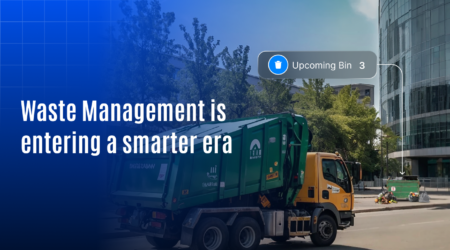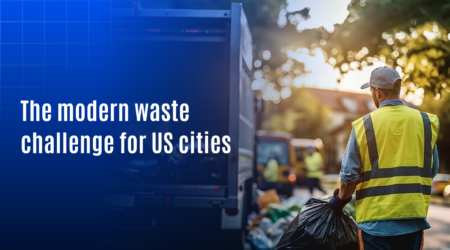10 Questions to Ask Before Investing in a Smart Waste Management Solution

Smart waste management solutions are transforming how cities, contractors, and facility managers operate. These platforms offer significant value by streamlining waste collection, enabling real-time bin tracking, automating route planning, and generating accurate reports that support compliance and efficiency.
However, not all solutions are built to meet every organization’s specific needs.
Many businesses invest in software that lacks scalability, fails to integrate with existing hardware, or does not offer the level of automation or reporting required for large-scale operations. Without proper evaluation, organizations risk choosing a solution that hinders growth instead of enabling it.
Before allocating your budget, it is critical to assess each platform carefully. The following ten questions will help you identify whether a smart waste management solution is technically sound, operationally effective, and financially viable for your business.
1. Does waste management offer real-time tracking of vehicles and bins?
Without live tracking, it’s not really “smart.”
- Can you monitor bin fill levels and truck locations in real time?
- Do you get alerts for route delays or missed pickups?
- Is the tracking visual, map-based, and mobile-friendly?
Real-time visibility improves control, efficiency, and customer satisfaction.
2. Can you customize modules for your operations?
One-size-fits-all doesn’t work in waste collection.
- Can you enable or disable modules based on your services?
- Does it support white-label branding for system integrators?
- Are user roles and dashboards customizable?
A modular system grows with your needs, not against them.
3. . Is the Waste Management Solution Built to Scale With You?
You might be managing 5 zones today but what about 50 tomorrow?
- Can the system handle thousands of assets and users?
- Does it support multi-location, multi-department structures?
- Can you onboard new clients quickly without performance issues?
Scalability means you’re ready for growth without switching systems later.
4. What type of hardware does it support?
Your software needs to play well with your hardware.
- Does it support RFID, GPS, fuel sensors, and bin fill-level sensors?
- Can it work with your existing IoT devices?
- Are there integration guides or API support?
Hardware compatibility is key to reducing setup costs and improving accuracy.
5.Will the Waste Management Solution Automate Daily Reporting and Route Planning?
Manual logs waste time and leave room for error.
- Can it auto-generate duty rosters and route assignments?
- Does it create instant reports with time stamps and geotags?
- Are SLA violations flagged automatically?
Automation isn’t just efficient, it ensures transparency.
6. Does it help you stay compliant with local waste regulations?
Being “smart” means staying ahead of compliance rules.
- Can the system track collection frequencies and disposal records?
- Does it produce audit-ready reports?
- Are there alerts for SLA breaches or regulatory gaps?
The right solution will make inspections easy, not stressful.
7. Is the Waste Management Solution Interface Simple Enough for Field and Admin Teams?
Even powerful systems fail if people can’t use them.
- Is the mobile app easy for drivers to operate on the go?
- Does the dashboard present data visually?
- Are alerts, analytics, and settings easy to find?
User adoption is just as important as functionality.
8. What kind of support and training will you receive?
Bugs happen. New features launch. Teams change.
- Is onboarding included with the package?
- Do you get access to live chat or ticket-based support?
- Are help docs, videos, or training webinars available?
Good support ensures you can focus on operations not troubleshooting.
9. How secure is the system?
You’re dealing with sensitive data routes, assets, performance.
- Is data encrypted and securely hosted?
- Does the platform comply with global standards like ISO or GDPR?
- Can you control data access across users and departments.
Data security isn’t optional. It’s fundamental.
10. What ROI can you expect and how fast?
You’re not just buying software. You’re buying results.
- Does the vendor showcase studies or real savings?
- How much time or cost could you save in the first 6 months?
- Can the system help win or retain large contracts?
Your investment should pay off in measurable, trackable ways.
Summary: ask first, invest wisely
A smart waste management solution can revolutionize your operations.
But only if you ask the right questions first.
Does it track in real time?
Can it scale with you?
Will it automate your daily grind?
Is the ROI worth the investment?
If you’re still guessing the answers now’s the time to find out.




